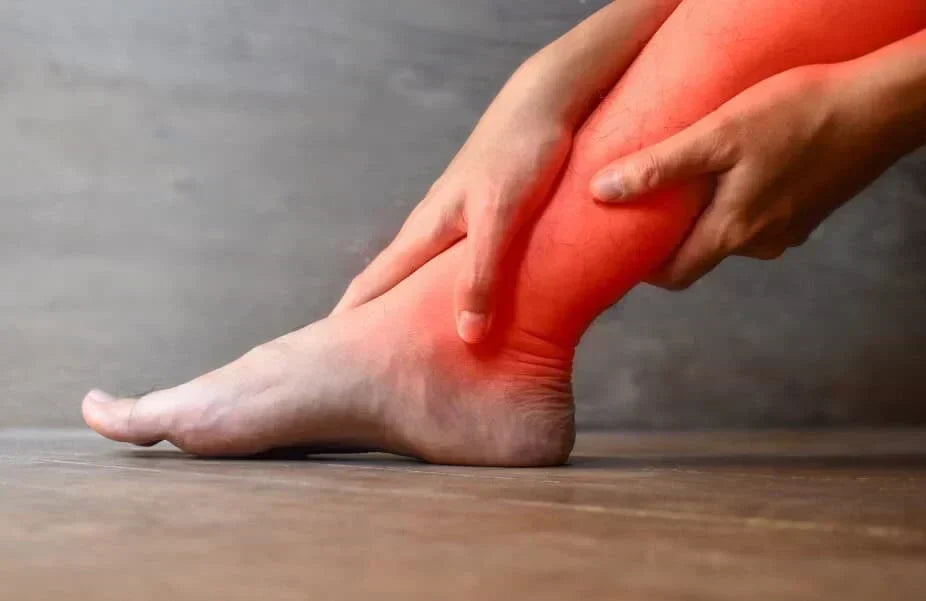Nerve twists—more commonly known as pinched or compressed nerves—can result in discomfort ranging from mild tingling to sharp pain. These sensations often affect the hip, thigh, calf, or foot, and they can significantly interfere with daily mobility. People with diabetes, in particular, may face heightened sensitivity in the legs and feet, making awareness and management even more critical.
Common Causes of Nerve Pain in the Leg
-
Spinal Compression
Issues such as herniated discs or spinal stenosis may irritate the nerves in the lower back, causing pain to radiate through the leg. -
Local Nerve Compression and Swelling
Inflammation due to repetitive motion, arthritis, or injuries can press on nerves in the legs, generating a sensation of twisting or tightness. -
Pinched Nerve from Posture or Pressure
Long hours of sitting, poor ergonomics, or excessive weight can compress nerves in the lower back or hips, impacting nerve signals down the leg. -
Other Factors
Old injuries, overstretched nerves (sprains), or incorrect workout techniques can result in nerve pain, especially if nerve endings are already vulnerable.
Symptoms to Watch For

Nerve issues manifest in multiple ways:
-
Tingling (pins and needles) in the feet or legs
-
Shooting pain from the lower back down the thigh
-
Muscle weakness or heaviness in the leg
-
Numbness or loss of balance
-
Swelling, particularly around the ankle or foot
People with diabetes may also notice increased sensitivity in the lower limbs due to peripheral neuropathy. In such cases, protecting the feet from pressure and injury becomes essential. Wearing diabetic footwear for men or diabetic shoes for women helps cushion nerves and improve circulation, making each step less stressful on compromised areas.
Diagnosing the Discomfort
-
Physical Examination
Doctors assess pain points, reflexes, and sensation to determine nerve function. -
Imaging Techniques
X-rays, CT scans, or MRIs help locate disc issues or soft tissue compression. -
Nerve Conduction Tests
These track how fast electrical signals travel through nerves and reveal possible blockages or damage.
Treatment Pathways for Relief

Managing nerve pain involves both conservative care and medical procedures, depending on the severity.
Rest and guided physical therapy sessions help relieve pressure on affected nerves. Anti-inflammatory medications may be prescribed to control swelling and discomfort. In more stubborn cases, corticosteroid injections may be used. Surgery is a last resort, often reserved for structural issues compressing major nerve roots.
Supportive care includes lifestyle changes like improving posture, avoiding sedentary habits, and maintaining a healthy weight. For those dealing with foot sensitivity or tingling, comfortable, orthopedic shoes with soft interiors and extra depth can ease nerve stress.
Tips for Prevention

-
Keep posture aligned whether sitting, standing, or lifting
-
Stretch daily to maintain nerve mobility
-
Use ergonomic chairs and supportive footwear
-
Avoid crossing legs or sitting in one position for extended periods
If you’re living with diabetes, foot health should be a daily priority. Our specialized diabetic footwear collections for men and women are designed with lightweight soles, cushioned insoles, and seamless interiors that prevent friction and support proper nerve function.
Stay Ahead of the Pain
Understanding how nerve twists impact the leg can help you respond before discomfort turns chronic. If you experience unusual tingling, numbness, or pain that limits mobility, don’t ignore it—seek guidance, follow conservative treatments, and support your recovery with the right footwear. When nerve health matters, your shoes shouldn’t be an afterthought. At DiabeticShoe.in, you’ll find the comfort and support your feet deserve.








